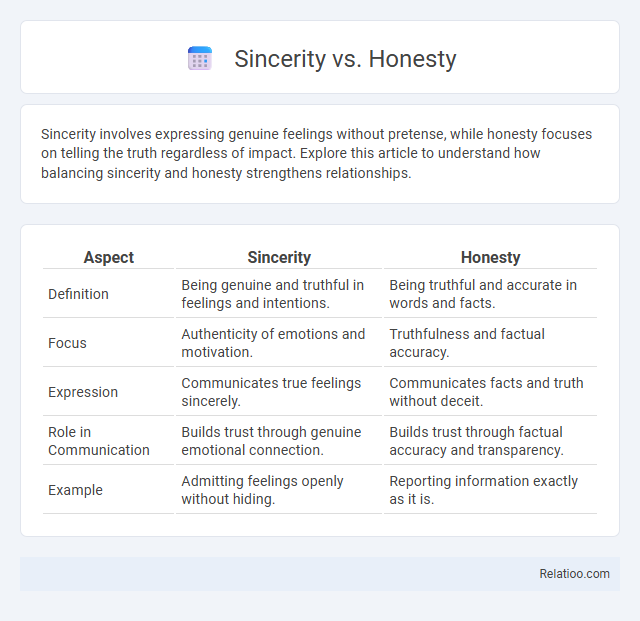Sincerity involves expressing genuine feelings without pretense, while honesty focuses on telling the truth regardless of impact. Explore this article to understand how balancing sincerity and honesty strengthens relationships.
Table of Comparison
| Aspect | Sincerity | Honesty |
|---|---|---|
| Definition | Being genuine and truthful in feelings and intentions. | Being truthful and accurate in words and facts. |
| Focus | Authenticity of emotions and motivation. | Truthfulness and factual accuracy. |
| Expression | Communicates true feelings sincerely. | Communicates facts and truth without deceit. |
| Role in Communication | Builds trust through genuine emotional connection. | Builds trust through factual accuracy and transparency. |
| Example | Admitting feelings openly without hiding. | Reporting information exactly as it is. |
Understanding Sincerity: Definition and Importance
Sincerity involves genuine expression of thoughts and feelings without pretense, distinguishing it from honesty, which centers on truthfulness in words and facts. Understanding sincerity is crucial because it builds trust and fosters authentic relationships by ensuring your intentions are clear and heartfelt. Embracing sincerity enhances personal integrity and deepens your connections with others, making it a foundational value in effective communication.
Defining Honesty: What Does It Really Mean?
Honesty entails consistently conveying the truth, maintaining transparency, and upholding integrity in all actions and communications. It involves being straightforward without deception, ensuring that facts and feelings are expressed accurately and responsibly. Genuine honesty fosters trust and credibility, forming the foundation for authentic relationships and ethical behavior.
Core Differences Between Sincerity and Honesty
Sincerity refers to the genuine expression of one's true feelings and intentions without pretense, whereas honesty focuses on truthfulness and the accurate representation of facts. The core difference lies in sincerity being an internal emotional state, while honesty involves external communication and adherence to truth. Understanding this distinction clarifies interpersonal dynamics, as sincerity emphasizes authenticity, and honesty emphasizes factual correctness.
The Emotional Impact of Sincerity
Sincerity profoundly influences emotional connections by fostering genuine trust and vulnerability, unlike honesty which primarily involves factual truthfulness. Sincere expressions resonate deeply, creating a sense of authenticity that strengthens interpersonal bonds and emotional security. This emotional impact promotes empathy and openness, essential for meaningful relationships and personal growth.
Honesty’s Role in Trust and Relationships
Honesty is foundational for building trust in relationships by ensuring transparency and reliability between individuals. Unlike sincerity, which reflects genuine feelings, honesty emphasizes truthfulness in communication and actions, fostering a secure and dependable connection. Maintaining consistent honesty reduces misunderstandings and strengthens emotional bonds, making it indispensable for long-term relationship success.
When Sincerity Can Exist Without Honesty
Sincerity reflects the genuine expression of your feelings or beliefs, which can sometimes exist without honesty if those feelings are based on falsehoods or misunderstandings. Honesty involves conveying facts truthfully, while sincerity centers on authenticity of intent rather than factual accuracy. You may sincerely express a mistaken belief, demonstrating sincerity without full honesty.
Real-Life Scenarios: Sincerity vs. Honesty
Sincerity involves expressing genuine feelings and intentions, often reflecting internal emotions, while honesty centers on communicating facts truthfully without deceit. In real-life scenarios, sincerity manifests when a friend shares heartfelt concerns even if uncomfortable, whereas honesty is evident when someone provides accurate information despite potential negative outcomes. Both are crucial for trust-building, but sincerity emphasizes emotional truthfulness, and honesty prioritizes factual accuracy.
Benefits of Practicing Both Sincerity and Honesty
Practicing both sincerity and honesty cultivates trust and strengthens your relationships by fostering genuine communication and transparency. Honesty ensures that your words and actions are truthful, while sincerity adds depth by expressing your true feelings and intentions authentically. Embracing both qualities enhances personal integrity and promotes a respectful, supportive environment in all interactions.
Common Misconceptions About Sincerity and Honesty
Common misconceptions about sincerity and honesty often confuse the two as interchangeable, but sincerity involves genuine feelings and intentions, while honesty focuses on conveying truthful information. Many believe that being honest means expressing every thought bluntly, yet honesty is about truthfulness without unnecessary harm, and sincerity requires aligning words with authentic emotions. Understanding these nuances helps you foster trust and clear communication in relationships.
Building Authentic Connections: Striking a Balance
Sincerity involves genuinely expressing true feelings, while honesty emphasizes factual truth without deception, both essential for building authentic connections. Striking a balance requires being open and transparent (honesty) while conveying emotions with heartfelt authenticity (sincerity) to foster trust and meaningful relationships. Prioritizing empathy and consistency ensures communication resonates deeply, creating solid, genuine bonds.

Infographic: Sincerity vs Honesty
 relatioo.com
relatioo.com